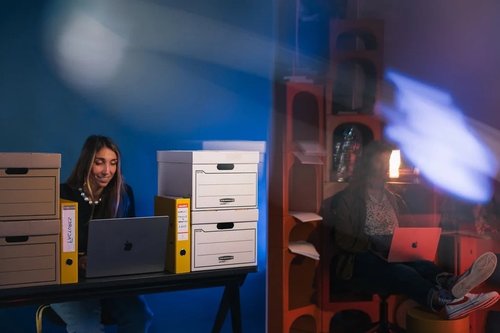The office lunch break debate: Social bonding or solo recharge?
Nov 05, 2024
3 mins

Lunch breaks are more than just a pause for food—they’re a much-needed respite from the demands of the workday and an opportunity to recharge. Whether it’s grabbing a salad from Sweetgreen, a sandwich from Pret, or microwaving last night’s leftovers, everyone has their preferred way of spending this midday break. But for many employees, especially in office settings, navigating the social expectations around lunch can cause a surprising amount of stress. Should you eat at your desk, join colleagues, or simply take the time for yourself?
Taking a lunch break isn’t just a good practice; studies show it has clear benefits for productivity, creativity, and workplace satisfaction. However, a more complex question emerges: how should employees spend this time in ways that balance social expectations with personal comfort?
The benefits of taking a lunch break
While lunch breaks are often seen as a simple pause for food, they hold surprising power in enhancing both individual well-being and workplace dynamics. Stepping away from work, even briefly, can be one of the most valuable moments in the workday.
Boosting productivity and creativity
Besides the serotonin boost from enjoying a mid-day meal, studies find that employees who take regular lunch breaks report higher levels of engagement, productivity, and job satisfaction. Taking a break from the computer or office tasks gives the brain a chance to rest and reset, often resulting in fresh perspectives on challenges.
Research even finds that breaks encourage creativity and can help you find more insightful answers to problems you’re trying to solve. This ‘aha’ effect of stepping away allows employees to return to their desks with renewed focus and, often, innovative solutions. As a result, a consistent lunch break is beneficial for individuals while also acting as a productivity booster for the company overall.
Building stronger teams and connections
The benefits of lunch breaks grow even more impactful when coworkers come together. In roles where teamwork and trust are essential, such as firefighting or emergency response, meals shared among colleagues have been found to increase cooperative behavior and team cohesion. For firefighters, in particular, eating together plays a central role in team bonding and effective performance on the job.
Lunch breaks also serve as an opportunity to network and build connections across departments, especially in creative and collaborative industries. A more relaxed setting over lunch allows colleagues to exchange ideas and solutions informally, helping foster a sense of community and camaraderie. As Ava DuVernay, the acclaimed filmmaker, noted in a recent interview with New York Times Style Magazine, “Breaking bread is a way to engender that sense of community … Sitting down, inviting people to be themselves, sharing a good meal—these are the building blocks [of an inclusive community].”
The role of lunch in corporate culture
In corporate settings, lunch breaks take on a different dynamic. With an increasing number of professionals eating at their desks, the social and networking opportunities presented by a communal lunch can be a valuable but often overlooked resource.
“Lunch in the office is more than just a time to eat,” says Eva Chan, a career expert from Resume Genius. “It’s also a golden opportunity to connect with people and make yourself more visible.” Social lunches can help build relationships, foster team morale, and even positively impact an employee’s standing when it comes to new projects or promotions. In a world where networking often opens doors, making time to connect with colleagues over lunch can create a valuable professional advantage.
However, for some, particularly introverted employees, social lunch hours can feel daunting and even exhausting.
The introvert versus the lunch break
Not everyone feels energized by social lunch breaks. For introverts, maintaining a balance between personal recharge time and social expectations can be challenging. “Introverts are highly aware that communal lunches can strengthen team relationships and open up informal networking opportunities, which are valuable for career growth,” explains Janice Chaka, CEO at The Career Introvert. “The struggle is to balance personal needs with social expectations.”
For introverts, this balance might mean being selective about when they join group lunches, finding days when it feels more natural to connect. Chan, who follows a hybrid work schedule, takes a more structured approach: “I’ll plan lunches with my coworkers on days when I know more of them are free and in the office which makes it feel intentional and enjoyable,” she shares. “Rather than showing up for office lunches for the sake of it, making strategic, meaningful connections is what matters.”
For others, maintaining boundaries could mean opting out of lunch meet-ups in favor of other networking events, like company happy hours or holiday gatherings, and using the lunch break solely for personal time.
Key takeaways: Making the most of your lunch break
The lunch break may seem like a simple part of the workday, but it’s actually a crucial period for recharging, building connections, and enhancing productivity. Here’s what employees and managers alike can take away from the evolving lunch break landscape:
- Lunch breaks offer more than just a meal. They’re a time to recharge, boost productivity, and encourage creativity, giving employees a much-needed break from work demands.
- Team lunches can strengthen workplace bonds and increase trust and collaboration. However, for introverts or those who prefer solo time, individual lunch breaks can be just as beneficial for mental well-being.
- The ideal lunch culture is flexible. A company that respects employees’ personal choices about how to spend their lunch breaks fosters a healthier work environment where individuals feel empowered and supported.
Photo: Welcome to the Jungle
Follow Welcome to the Jungle on Facebook, LinkedIn, and Instagram and subscribe to our newsletter to get our latest articles every week!

More inspiration: Working with colleagues

The 5 coworkers you’ll meet during the holiday season
'Tis the season for holiday personas! From The Grinch to Buddy the Elf, spot the 5 festive coworkers in your office. Who’s who this year?
Dec 17, 2024

Office holiday parties: Networking goldmine or overhyped obligation?
Should you attend your work holiday party? Discover the pros, cons, and tips to decide if it’s worth your time this year.
Dec 03, 2024

9 signs your office could be a sitcom
Whether it’s a quirky boss, demanding clients, or a workplace villain, these characters exist in every office. Grab your popcorn and see who’s who!
Nov 07, 2024

Dealing with a narcissistic coworker? Here’s how to survive
Overworked and overlooked by a narcissistic coworker? Learn how to spot the signs, set boundaries, and keep your sanity intact.
Oct 30, 2024

Office Politics: 7 types of colleagues you’ll meet in every workplace
Ever wondered who you are in the game of office politics? From Bureaucrats to Rebels, discover the 7 types of colleagues we all work with.
Oct 29, 2024
The newsletter that does the job
Want to keep up with the latest articles? Twice a week you can receive stories, jobs, and tips in your inbox.

Looking for your next job?
Over 200,000 people have found a job with Welcome to the Jungle.
Explore jobs

